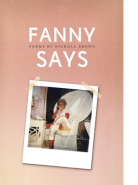
Book Review: Fanny Says by Nickole Brown

Fanny Says
Poems by Nickole Brown
BOA Editions, April 2015
ISBN-13: 978-1938160578
$16.00; 148pp.
Reviewed by Danny Caine
The back cover of Nickole Brown’s Fanny Says calls the book an “unleashed love song to a Kentucky grandmother.” One would expect such a project to have a certain degree of nostalgia and folksy southern charm, and Fanny Says certainly delivers on both counts. In the opening poem, “For Our Grandmothers,” Brown writes of her ride home from the hospital after being born: “With no shoulder belts or infant seats or air bags it was simple: she held me up front for my first ride.” Later, during “Fanny Says Sometimes It’s Worth the Whupping,” one of many transcriptions of Fanny’s telephone monologues, Brown-writing-as-Fanny says “I remember the first time I seen the sign: Air Conditioned. I was at the movie theater, the one for all the rich people. And I said to myself: What’s that?”
In addition to talk of more “simple” days, Fanny Says serves up a hearty dose of thick southern drawl; in “Fanny Linguistics: Malapropisms,” the reader is taught to:
Unpack chester drawers to find
chest of drawers,
Tandalon to Tylenol,
furelle to foil,
gazebo pills to placebo,
salmonella candles to citronella,
Brown’s study of the Kentucky accent is best when she approaches it like a linguist, as she does in her ode to Fanny’s favorite word, “Fuck:”
is what she said, but what mattered was the tone—
not a drive-by spondee and never the fricative
connotation as verb, but from her mouth
voweled, often preceded by the well, with the “u” low
as if dipping up homemade ice cream, waiting to be served
last so she’d scoop the fruit from the bottom, where
all the good stuff had settled down.
But Fanny, we soon learn, is far too strange to fit into a conventional story about the good-ole-days and how people talk funny back home. For one thing, her medical advice often boggles the mind. In “Fanny Says How to Tend Babies,” she says not only that “When expecting, you can smoke and tan and dye your hair, but don’t you go reaching up on the clothesline,” but also that “Breastfeeding will ruin your tiddies, so steer clear of all them hippies that tell you what to do.” This is where the book is funniest: when Fanny’s beliefs and superstitions defy expectation and veer into the outlandish.
It surfaces again whenever Fanny’s devotion to brand names comes up. Pepsi, for instance, “was a bitch who knew how to ash with two taps from a two-inch filter, / not one nicotine stain on her manicured hands.” Clorox was “a poison she saw fit enough / for us, for all of us, to drink.” Crisco, amazingly, becomes an aid for when “you have to wear your husband out, and sometimes / you might be counting flower petals on wallpaper, but you best pretend, / Just put a little shortening up there, she said / he’ll never know the difference.” Fanny Says’s first half is replete with ribald humor like this.
However, Fanny Says does not shy away from the darker side of aging. “EPO,” a poem which chronicles an ill-fated attempt to obtain a restraining order against Fanny’s husband, heartbreakingly juxtaposes Fanny’s “disco cases” and “size-five house slippers” with the dirty urban grit of the downtown courthouse; the story of Fanny in such a strange environment is full of pathos. In the collection’s third section, titled “A Genealogy of the Word,” Brown challenges Fanny about her fast-and-loose use of the N-word, which “out of her mouth” was “visible, a skidmark, a shit / stain.” When a black house-helper, as a recurring joke, asked Fanny what would happen if her granddaughter dated a black man, “Fanny’d reach into her roller bowl, pull out her gun” and say “if she was with a nigger man, I’d have to kill her.” To this Brown replies, “it was never the gun that made me / flinch.” This picture of Fanny—coming towards the end of a book in its own nearly 20-page section—is a darker twist on the Pepsi-loving, foul-mouthed Fanny we’ve come to know. It allows the book to be more than a rose-tinted portrait, and it introduces the final section, in which we are witness to Fanny’s death.
In one of the collection’s final poems, “For My Grandmother’s Perfume, Norell,” Brown catches a scent of Fanny’s perfume at the supermarket, and writes
I was a simple animal craving the deep memory
………….worn by a stranger oblivious of me. If I had courage
the kind of fool I’d like to be
…………I would have pressed my face to her small
…………………….shoulder, and with the sheer work of
………………………………..two pink lungs, I would have breathed
enough to
…………conjure
…………………….you back
.………………………………to me.
It is a lovely sentiment, and its aching grief is a far cry from the outlandish humor of the book’s first half. The book’s more serious second half complements the ribald first, and allows Fanny Says to become equal parts romp through weird southern quirks, challenge of antiquated attitudes, and elegy for a beloved grandmother. Like Allen Ginsberg’s Kaddish or Sarah Blake’s Mr. West, this book draws its energy from the personality of its main character/subject and the way the speaker engages with it. The main character of Fanny Says is likeable, foulmouthed, strange, immensely memorable, and perhaps most importantly, very funny. In memorializing Fanny, Nickole Brown has made her come alive.
Danny Caine‘s poetry has appeared in Mid-American Review, Hobart, Atticus Review, and New Ohio Review, among other places. He hails from Cleveland and lives in Lawrence, KS where works at The Raven bookstore and serves as managing editor of Beecher’s.
